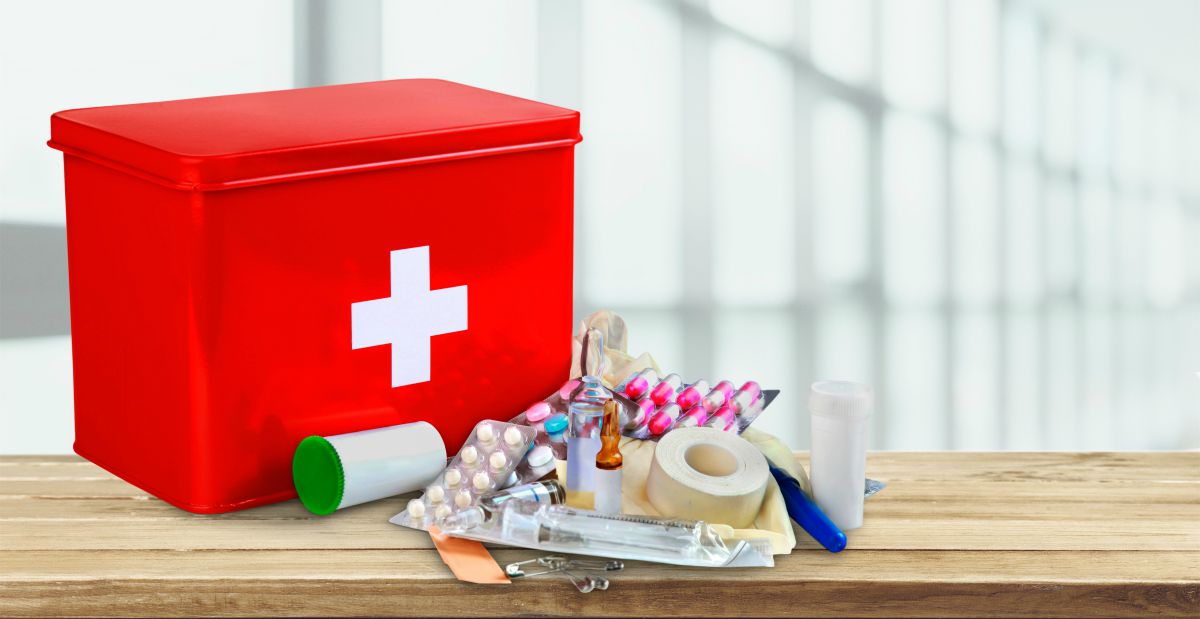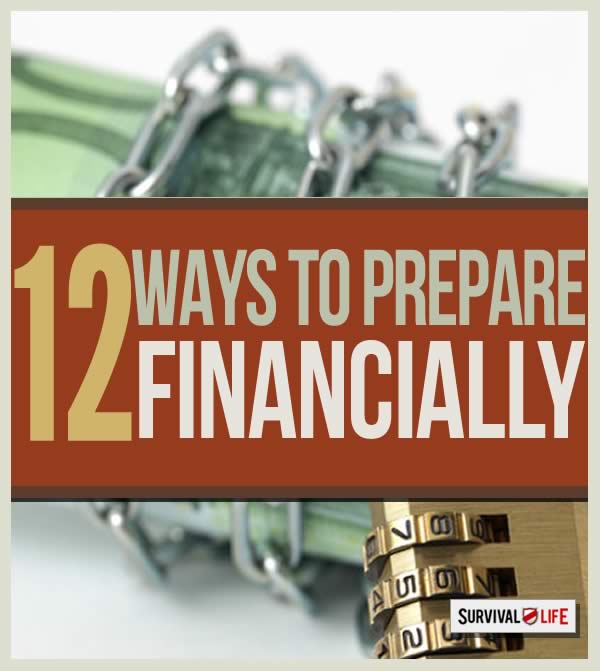Ways To Prepare For Economic Collapse | 12 Things You Should Do Read more on: http://totalsurvival.net
Take these tips and ways to prepare for an economic collapse, so you are never caught off guard when worse comes to worst!
RELATED: 17 Signs That Most Americans Will Be Wiped Out | Financial Collapse
In this article:
- Economic Collapse: A Catastrophe Waiting to Happen
- Don't Panic and Prepare for Economic Collapse
- Take Care of Your Finances
- Don't Put All of Your Eggs in One Basket
- Save and Invest Before an Economic Collapse
- Store Food and Learn to Grow Your Own
- Be Financially Smart
- Store Water and Other Supplies
- Plan For Your Defense
- Prepare a First Aid and Medical Kit
- Plan for When the Grid Goes Down
- Plan for a Comeback from an Economic Collapse
- Have a Plan A, B, C, and D…
How to Prepare for Economic Collapse and Survive
Economic Collapse: A Catastrophe Waiting to Happen
Economic collapse isn't a question of if but when. While it seems unlikely at present with a healthy, if not booming economy, we can never be too certain with the unstable political setting.
We've had a preview of an economic collapse with The Great Depression of 1929 to 1933, and the Great Recession only recently from 2008 to 2009–it will happen again and it could be worse.
It still pays to prepare, and an economic collapse is an inevitability every prepper should consider. Now, there is more to being a prepper than stockpiling food, water, and weapons.
Sure, having plenty of survival food and a well-stocked bug out bag is essential for every survivalist. But that's only half of the equation.
Most people think money will lose its value when the U.S. economy collapses. They may be right, but then again, they may not.
No one can really say what the future will be like when the unthinkable happens. But if there's one thing we know as preppers, it's that we should always hope for the best but plan for the worst.
Preparing for a financial collapse is a different type of disaster preparedness, but it is no less important. Here are a few ways you can set aside resources, prepare, and survive the economic collapse:
1. Don't Panic and Prepare for Economic Collapse
Every prepper knows that panic is a no-no in an emergency situation if you are to survive. Panic only occurs when you're not prepared and you didn't think the inevitable could happen.
You don't want to be caught in a store fighting your way, to get supplies you should have had if you were prepped. That is why panic buying and looting occurs and that's the last thing you should find yourself in.
So if you are here reading this article, you're doing a fine job of keeping yourself informed and taking the first step to survive an economic collapse or any other survival situation.
2. Take Care of Your Finances
Follow a strict financial flow with everything documented so you keep your finances organized. Make sure to also set your money to where it's intended to be.
Taking care of your finances also includes taking care of your debt. And if you think an economic collapse will wipe out your debt or forgotten, you're dead wrong.
In fact, debt collectors will be harsher than ever and your debt could have you ending up in jail. Overextending your loans is something you don't want to be doing right now.
3. Don't Put All of Your Eggs in One Basket
Relative to taking care of your finances, make sure to never put all your money in the same place. You know what happens when you drop your basketful of eggs.
It's also a good idea to keep some money at home because a system crash could occur along with an economic collapse. This will render you unable to make transactions with the bank and get cash, especially if you're living from paycheck to paycheck.
Setting up an emergency fund for this purpose isn't a bad idea either. Even a piggy bank at home could prove to be useful in emergency situations.
4. Save and Invest Before an Economic Collapse
If you think the rich don't prep, you're mistaken, too. In fact, some Silicon Valley billionaires and celebrities are investing in properties they can run to if SHTF.
Besides being financially independent, savings and investment will also help you prepare for an economic collapse. The added income in investment will see you through investment and purchase of supplies like solar power and water system.
You might also want to think about investing in gold and silver. Inflation could skyrocket rendering U.S. dollar with little to no value.
You might also want to invest in a bug out property outside big cities because the big city is what you don't want to be caught in if all hell broke loose. Supplies may be abundant in the city but it will be insufficient with the huge population.
Where you want to be is a secluded, stable, and well-supplied bug out shelter. Invest in this kind of area you can go to, which for the meantime, can serve as a vacation home.
5. Store Food and Learn to Grow Your Own

Store long storing food items like powdered milk, sugar, salt, and grains or seeds. Fresh fruits and veggies don't store well except when canned, but gardening can supplement your needs for fresh and healthy foods.
RELATED: 20 Global Catastrophes To Prepare For NOW
6. Be Financially Smart
When Donald J. Trump won the presidency, some personalities took to Twitter to announce they were going to sell their stocks anticipating an economic collapse that didn't happen.
It would have been a terrible decision had they done so indeed since the stocks went right back up and performed so well. The lesson here is, don't let your emotions interfere with your financial decisions.
Another unwise move when it comes to prepping for a financial collapse is putting all your money into prepping. Preparing for economic collapse doesn't mean you have to go without now, so don't sacrifice your kids' college fund for the sake of financial preparedness.
The amount you set aside will depend on your needs and how much your family is capable of saving. Being financially ready for an economic collapse isn't about setting aside all of your money.
It's about watching your spending now, managing your bills and watching your accounts closely to cut out unnecessary spending here and there. In the end, these small habit changes will make all the difference.
7. Store Water and Other Supplies
Safe drinking water, hygiene kit including toilet paper are some of the things you need to store because these are items you can't easily make from scratch. While you can still live on with water you don't have to boil to ensure it's drinkable, do so by stocking up on bottled water.
8. Plan for Your Defense
All your prepping could go south or to someone else if you have no plans for self-defense. Start self-defense or gun lessons, and you might also want to explore your self-defense arsenal now.
It would also be a good idea to invest in a home security system for your residence and your bug out shelter.
9. Prepare a First Aid and Medical Kit

In any catastrophe, first aid, and medical kit are one of the topmost essentials. If you or a family member have some type of medical condition, it must be considered in prepping your medical kit.
The cost of medicines and medical supplies could skyrocket in an economic collapse.
10. Plan for When the Grid Goes Down
Without power, everything will go on a standstill, including communications. Plan with your family and discuss how you can reach each other in case communications fail.
For a generation almost entirely dependent on power, it'll be hard to give up on a night light, AC, even TV. You can still do that after an economic collapse and that's where alternative energy sources come into play which you have to start investing on in now.
11. Plan for a Comeback from an Economic Collapse
A financial collapse may end sooner and the economy may recover fast so you don't want to give up entirely on the system. When disaster strikes you must also be able to access your funds and records, giving you a chance to recover quickly and be informed of your credit.
Ultimately, you want to avoid the problems faced by those who fail to prepare. You're going to need money not only for your family's basic necessities but also for repairs in case of damages to your property.
Bear in mind that your financial records like passbooks, checkbooks, and even your credit cards must be included in your list of important documents. Store them in a vault or another place that's safe and secure.
In the event of economic collapse, money and financial records will be in high demand, and identity theft will run rampant. Learn how to protect yourself now to avoid these problems in the future.
12. Have a Plan A, B, C, and D…
Something somewhere is almost always bound to go wrong so also prepare a plan B, C, and D.
Make sure you have something else up your sleeves if worse comes to worst because not everything works according to your plan.
This video from Epic Economist will show you the list of things to hoard for economic collapse:
“It happened before, it will happen again,” sounds cliche but perfectly possible. With these tips and ways to prepare for an economic collapse, you can take the first step to prepare for the worst.
Lastly, if you can help it, don't tell people beyond your immediate family, you are prepping if you don't want people knocking on your door asking for things they know you possibly have.
Did we miss out on an idea on how to prepare for an economic collapse? Share your thoughts about it in the comments section below!
Up Next:
- 65 Survival Lessons From The Great Depression
- How To Retire Comfortably After A Financial Crisis
- Reloaded Bullets Save Money And Trouble, Unlimited Ammo Shows How
For awesome survival gear, you can’t make at home, check out the Survival Life Store!
Follow us on Facebook, Instagram, Twitter, Pinterest, and Tumblr!
**Disclaimer: All content on this site is for informational purposes only. Please read our full disclaimer**

Editor’s Note: This post was originally published on November 3, 2014, and has been updated for quality and relevancy.
This Article Was First Found at survivallife.com Read The Original Article HereRead Full Article Here: Ways To Prepare For Economic Collapse | 12 Things You Should Do

No comments:
Post a Comment